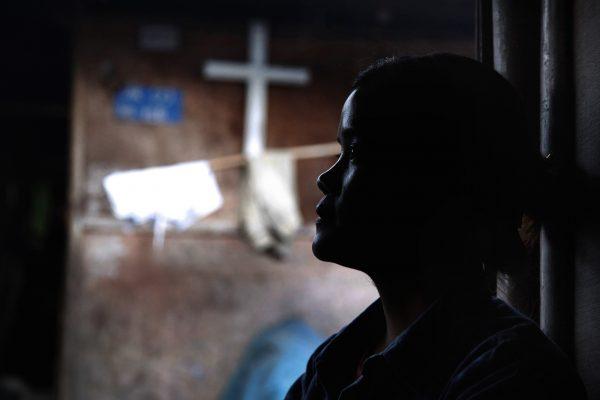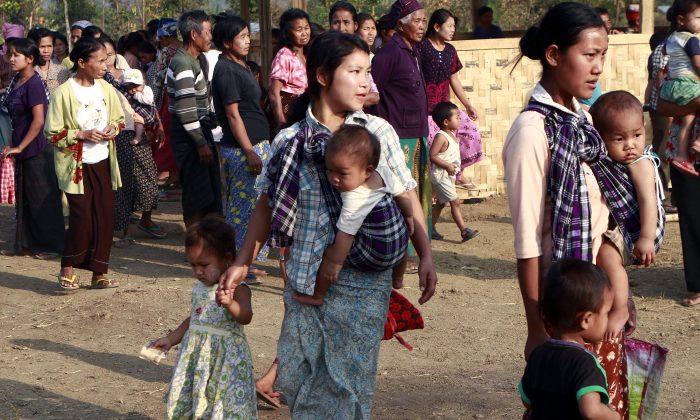BANGKOK—Authorities in China and Burma are failing to stop the brutal trafficking of young women, often teenagers, from the conflict-ridden Kachin region for sexual slavery, according to a report by Human Rights Watch.
The report released on March 21 says women are often tricked into traveling to China in search of work or kidnapped and held against their will to be sold as “brides” for Chinese men. Most of those taken hostage by Chinese families are locked up and raped, it says. Those who do escape are often obliged to leave children fathered by Chinese men behind.
The report urges authorities to do more to raise awareness about the risks of trafficking, provide more support for victims who return home, and to prosecute those guilty of crimes against them.
The 226 known cases of such trafficking in 2017 were only a fraction of the total number, since many victims are afraid or ashamed to come forward, especially given the lack of support from law enforcement or welfare services, the report says.
“Human Rights Watch’s research suggests the number of women and girls being trafficked is substantial and possibly growing,” it said.

The group interviewed 37 survivors of such crimes for the report. It said the women were sold to Chinese families for the equivalent of $3,000-$13,000 each. Twelve of those interviewed were under 18 when they were trafficked. The youngest was 14. It said 22 of them were held for a year or longer.
Often, the women are drugged and taken captive, left at the mercy of families with whom they can barely communicate.
“Most were locked in a room and raped repeatedly as the families that bought them wanted them to become pregnant,” said Heather Barr, author of the report and a co-director for women’s rights at Human Rights Watch.
The traffickers are able to lure women with false promises of jobs because of the lack of good options for making a living in camps for displaced people in northern Burma’s Kachin state.
As of September, there were about 100,000 people displaced inside Kachin, where the Kachin Independence Army, like other ethnic minority armed groups, has been fighting for greater autonomy for decades. Thousands of women and children have also fled their homes in neighboring Shan state, some across the border into China.
The porous border between southern China’s Yunnan Province and northern Kachin facilitates such trafficking, and the relative shortage of marriageable women, thanks to Chinese traditions favoring male heirs over girls has left many families in China desperate for brides.
Although Chinese authorities have been battling trafficking inside China as well, the families who buy the women are almost never prosecuted, the report says.
Some foreign brides from neighboring countries go voluntarily.
But for many, the experience is harrowing. One interviewee, Ja Htoi Tsawm, was kidnapped while doing farm work in China to support her family and held captive for two years. While she was away, her in-laws sold her house and put one of her children in an orphanage. Another of her four children died.
The report said that Burmese police and other authorities refused interviews by Human Rights Watch although the Ministry of Social Welfare did provide some data. Burma’s anti-trafficking police said they handled 130 cases of trafficking, 96 of which involved women, in January-July 2018, the report said.
Of 820 successful prosecutions for trafficking in 2008-2013, 534 cases involved forced marriages and an even larger share were with China. The trafficking networks span China.
Chinese authorities did not respond to requests for comment, it said.
The persisting conflict in areas of Burma has left millions of women and children vulnerable to great risk. U.N. investigators reported last fall on a fact-finding mission that found violence by the Burmese military in Kachin, Shan and the western state of Rakhine. It cited allegations of crimes by the military and other security forces including murder, torture, pillaging, execution without due process, rape, sexual slavery and hostage taking.
Members of the Kachin Women’s Association, a group affiliated with the Kachin Independence Organization that helps victims, were quoted as saying that at times they lack the money to help provide and top up SIM cards needed to keep in contact with the women still stuck in China.





